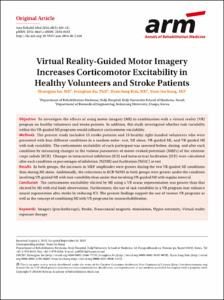KUMEL Repository
1. Journal Papers (연구논문)
1. School of Medicine (의과대학)
Dept. of Biomedical Engineering (의용공학과)
Virtual Reality-Guided Motor Imagery Increases Corticomotor Excitability in Healthy Volunteers and Stroke Patients
- Keimyung Author(s)
- Ku, Jeong Hun
- Department
- Dept. of Biomedical Engineering (의용공학과)
- Journal Title
- Annals of Rehabilitation Medicine
- Issued Date
- 2016
- Volume
- 40
- Issue
- 3
- Keyword
- Imagery (psychotherapy); Stroke; Transcranial magnetic stimulation; Upper extremity; Virtual reality exposure therapy
- Abstract
- Objective To investigate the effects of using motor imagery (MI) in combination with a virtual reality (VR)
program on healthy volunteers and stroke patients. In addition, this study investigated whether task variability
within the VR-guided MI programs would influence corticomotor excitability.
Methods The present study included 15 stroke patients and 15 healthy right-handed volunteers who were
presented with four different conditions in a random order: rest, MI alone, VR-guided MI, and VR-guided MI
with task variability. The corticomotor excitability of each participant was assessed before, during, and after each
condition by measuring changes in the various parameters of motor-evoked potentials (MEPs) of the extensor
carpi radials (ECR). Changes in intracortical inhibition (ICI) and intracortical facilitation (ICF) were calculated
after each condition as percentages of inhibition (%INH) and facilitation (%FAC) at rest.
Results In both groups, the increases in MEP amplitudes were greater during the two VR-guided MI conditions
than during MI alone. Additionally, the reductions in ECR %INH in both groups were greater under the condition
involving VR-guided MI with task variability than under that involving VR-guided MI with regular interval.
Conclusion The corticomotor excitability elicited by MI using a VR avatar representation was greater than that
elicited by MI with real body observations. Furthermore, the use of task variability in a VR program may enhance
neural regeneration after stroke by reducing ICI. The present findings support the use of various VR programs as
well as the concept of combining MI with VR programs for neurorehabilitation.
- Keimyung Author(s)(Kor)
- 구정훈
- Publisher
- School of Medicine
- Citation
- Hyungjun Im et al. (2016). Virtual Reality-Guided Motor Imagery Increases Corticomotor Excitability in Healthy Volunteers and Stroke Patients. Annals of Rehabilitation Medicine, 40(3), 420–431. doi: 10.5535/arm.2016.40.3.420
- Type
- Article
- ISSN
- 2234-0645
- Appears in Collections:
- 1. School of Medicine (의과대학) > Dept. of Biomedical Engineering (의용공학과)
- 파일 목록
-
-
Download
 oak-2016-0267.pdf
기타 데이터 / 725.84 kB / Adobe PDF
oak-2016-0267.pdf
기타 데이터 / 725.84 kB / Adobe PDF
-
Items in Repository are protected by copyright, with all rights reserved, unless otherwise indicated.